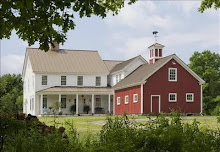Photo: The Boston Globe
As pollen counts reach record levels this season, now is the perfect time to consider ways to make your garden more allergy-friendly. Landscape designer and neighbor of THE CONCORD GREEN HEALTHY HOME, Ellen Matheson, stopped by to share her expertise as we finalize landscape plans for the site. She even forwarded the highly useful article below for anyone with allergies, which includes over 50 million Americans. Thank you, Ellen!
Twenty-Two Tips for Producing Low Allergy Gardens
by Thomas Leo Ogren
What we plant in our own yards often has a direct effect on our own health and the health of those near us. A pollen-producing male tree in our own yard will easily expose us to ten times more pollen than would a similar tree growing just down the block. This can be compared to second-hand smoke. Yes, it is possible to inhale some smoke from a person who is smoking a block or two away from you, but it is hardly the same as someone smoking right next to you. It is the same with plants. If your own yard is full of allergenic plants, then you will be exposed most.
The greater your exposure, the greater your chances are of having allergies and (or) asthma. Here are some tips to avoid allergies and asthma.
1. Don't plant any male trees or shrubs. These are often sold as "seedless" or "fruitless" varieties but they're males and they all produce large amounts of allergenic pollen.
2. Do plant female trees and shrubs. Even though these may be messier than males, they produce no pollen, and they actually trap and remove pollen from the air. There is also some very good all-female sod to use for pollen-free lawns. As an added bonus, these female lawns stay low and require less frequent mowing.
Eryngium x "Big Blue" Sea Holly. Photo: North Creek Nurseries
3. Plant disease-resistant varieties: mildew, rust, black spot and other plant diseases all reproduce by spores and these spores cause allergies. Disease resistant plants won't get infected as much and the air around them will be healthier.
4. Use only trees and shrubs well adapted for your own climate zone. Plants grown in the wrong zone will often fail to thrive. Because they are not healthy, they will be magnets for insects. Insect residue, "honeydew," is a prime host for molds and molds produce allergenic mold spores. Often native plants will be the healthiest choices.
5. Be careful with the use of all insecticides, fungicides, and herbicides. Accidental exposure to all of these chemical pesticides has been shown to cause breakdowns in the immune system. Sometimes one single heavy exposure to a pesticide will result in sudden hypersensitivity to pollen, spores, and to other allergens. This is as true for pets as it is for their owners. Go organic as much as possible. Make and use compost!...
... For the full article, including all 22 helpful tips, click here.


































No comments:
Post a Comment